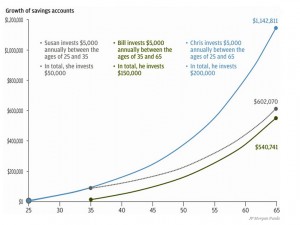How to Get Money Interest Free
By Tim McMahon |
Retirement Funds: Smart Investments for Beginners
Most people experience some level of fear when trying something new. And if that new thing has to do with your finances, it can seem daunting and risky. This is often the case when you first begin investing for retirement. How much you should you invest? What if you need the money before you retire? What should you invest in? How much is enough for a stable retired life? This article attempts to highlight some ways you can successfully wade through the murky waters of retirement investing.
Read MoreBudgeting for Wants Not Just Needs
For many people, the idea of being on a budget is about as appealing as being on a strict diet. After-all who wants to cut out everything you enjoy? This not only sounds miserable it leads to unsuccessful budgeting for most people. The science of behavioral finance is gaining ground as a way of increasing financial well-being by creating a more reasonable approach to budgeting without the harsh cutbacks.
Read MoreTips for Improving Your Retirement
Most of us spend the majority of our lives looking forward to retirement. Reaching the age of retirement is a milestone that signals a time to enjoy the fruits of our labor. It is a time when we can finally relax and enjoy life. If you or a loved one is a retiree, here are […]
Read More5 Things You Are Probably Paying Too Much For… And What You Can Do
The key to successful money management is to squeeze the most value out of each dollar you earn. Even if you currently track your expenses, you can always find new ways to cut costs, save money, and improve your lifestyle. In some cases, without even realizing it, you might be paying too much for your monthly bills and other expenses.
Read MorePenny Saved: 5 Ways to Put Away Extra Cash with DIY
Today every penny counts and doing things yourself can definitely mean the difference between a comfortable life and a budget stretched thin. There are many ways DIY can enable almost anyone to save a bit of cash. With hourly rates ranging from$20 -$50 and often $100 or more, it’s often the tasks for which we pay others that represent the largest expense. Here are five examples of DIY tasks you can do yourself.
Read MoreTricks to Raise Cash (After Checking the Couch Cushions)
Often we find too much month left after paying all the bills. Almost everyone could use a bit of extra money for gas, dining, emergencies, or just to save for rainy days. Following are a few tricks you can use for raising extra some cash.
Read MorePlanning Tips for Your Retirement
Retirement may seem like a distant or even unreachable goal, but it is a life event that is slowly nipping at your heels. While it should represent a reward after years of working hard, retirement can also be associated with uncertainty and more work for some. According to Careerbuilder.com as many as 54 percent of people have stated they plan to work after retirement.
Read More5 Ways You Can Make Your Home Feel New Without Breaking The Bank
When your home’s design starts to feel stale, you don’t have to knock down walls or replace all your furniture to refresh it. In fact, sometimes the smallest changes make the biggest difference in how your home looks and feels. Give these seven simple strategies a try when you tire of your home’s current decor. Do them all at once or pick and choose the ones that will make the biggest impact in your space.
Read MoreSaving Secrets to Keep Your Next Family Vacation under Budget
Family vacations are something everyone looks forward to all year long. It’s a time where you can focus on being together and experiencing new things. Unfortunately, it seems like travel only gets more expensive, especially as kids get older and you need more cash for food, souvenirs, and plane seating. For your next family trip, use these tricks to make the ordeal a little less expensive.
Read MoreTips for First-time Home Buyers
Buying a new home is an exciting adventure that requires careful planning and budgeting. Real Estate agents often break market conditions into two classifications i.e. a “Buyer’s Market” or a “Seller’s Market”. In the first eight years of the new millennium much of the world experienced a housing bubble. During this time the world was awash in liquidity and the real estate market was considered to be a seller’s market. Property was thought to “always appreciate” and so it was in high demand. In a typical sellers market homes receive multiple offers often within days or even hours of being listed. This would result in the price being bid up above the seller’s initial asking price. A buyer’s market will provide more flexibility in financing and room for negotiation. First-time home buyers can benefit from a few tips on navigating the higher standards of mortgages and what to look for in that first new house.
Read MoreTricks to Help You Survive Retirement Financially
Financial advisers strongly recommend that before you consider retirement you should be debt free. After all, if you couldn’t pay your debts with a higher income, how will you be able to do so with a reduced retirement income? But sometimes things don’t work out as planned, perhaps you are forced to retire earlier than planned due to downsizing or health issues, so it’s a good idea to have a backup plan in place.
Read MorePlanning Your Future: 4 Tips to Financial Security
Depending on your financial background… becoming financially secure can be an impossible dream, a wish, a goal or a foregone conclusion. We all know that financial stress can cause everything from relationship problems to health issues. So making financial security a reality will benefit you more than just financially. But what makes the difference between financial security being a dream and a reality? Most of the difference is in your head. Donald Trump could lose all his money and become a millionaire again very quickly primarily because he knows how to do it. Where if you gave someone in the Ghetto a million dollars he would probably be poor again in about the same amount of time. Here are four tips to get you started on the right track.
Read More












